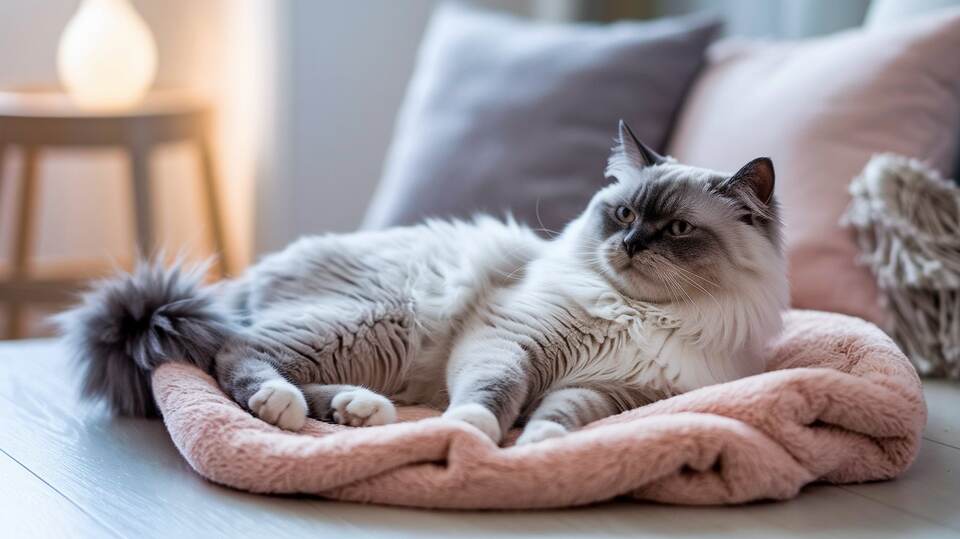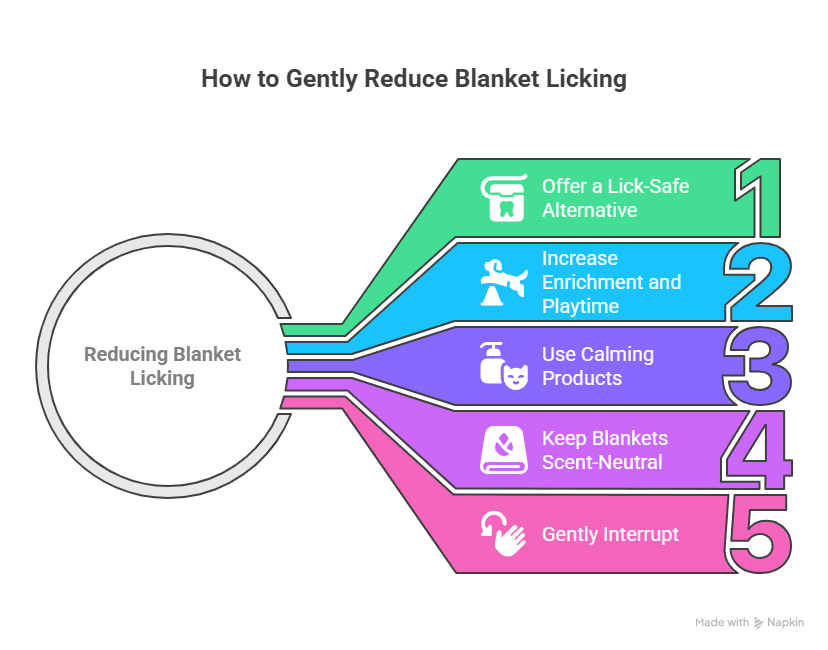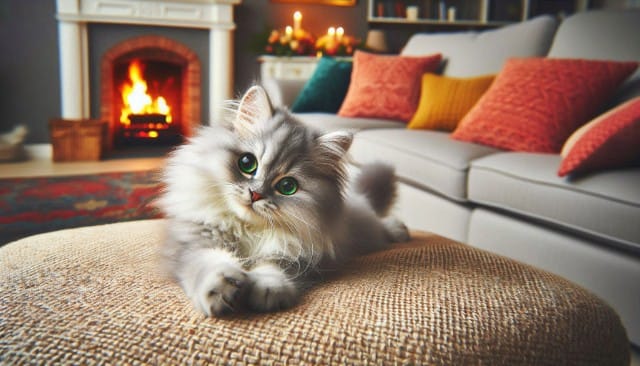
Introduction
You’re curled up on the couch under your favorite blanket, and here comes your cat—purring, pawing, and… licking? At first, it’s kind of adorable. But when it becomes a nightly ritual or your blanket starts to feel soggy, you might find yourself asking:
“Why does my cat lick my blanket?”
This quirky behavior is more common than you might think, and it can mean several things depending on your cat’s age, environment, and personality. In this article, we’ll explore the most common reasons behind this fuzzy habit—from emotional comfort to leftover food smells—and help you understand when it’s normal, and when it might be time to intervene.
Let’s decode the mystery behind this odd little obsession.
Is It Normal for Cats to Lick Blankets?
Yes, it’s usually a perfectly normal behavior.
Cats lick for a variety of reasons: to groom, to bond, to self-soothe, or even to explore their environment through taste and scent. When a cat licks a blanket, it’s often a combination of comfort, habit, and instinct.
But not all licking is the same. While occasional licking is generally harmless, excessive or compulsive licking, especially if paired with chewing or swallowing fabric, could be a red flag for something deeper like stress or pica (a condition where cats eat non-food objects).
Understanding why your cat is doing it is the key to knowing whether to let it be—or take action.
1. Comfort and Security (Like a Cat’s Emotional Weighted Blanket)
One of the most common reasons cats lick blankets is for emotional comfort.
Just like some people bite their nails or twirl their hair, cats may develop self-soothing habits. Licking a blanket mimics grooming behavior, which releases endorphins and helps your cat feel relaxed and safe.
Signs this is the reason:
- Your cat only licks when they’re sleepy or curled up
- They often purr or knead the blanket while licking
- They return to the same spot or blanket consistently
This is especially common in cats who:
- Were separated from their mother too early
- Have strong attachment to their human or routine
- Don’t have other stress outlets (like toys or high perches)
🧠 Fun fact: Some cats may even treat a favorite blanket like a surrogate “mom”—nuzzling, kneading, and licking it all at once.
2. Remnants of Nursing Behavior (Weaning Reflex)
If your cat was weaned too early (before 8–10 weeks), they may not have fully outgrown the instinct to suckle and lick soft materials. In this case, your blanket serves as a replacement for mom’s fur.
Clues that your cat is displaying nursing behavior:
- They knead and lick the blanket at the same time
- They prefer fleece, wool, or soft microfiber fabrics
- The behavior started when they were still kittens and never really stopped
This kind of licking can be calming, but it also becomes a habit if not redirected early on.
3. Grooming Instinct or Affection
Cats groom themselves (and each other) as a form of bonding. If your blanket smells like you, your cat may simply be extending that affection to something that carries your scent.
Or, they might just think it needs a good cleaning!
Signs it’s grooming-related:
- The licking is slow and methodical, like they’re cleaning
- They often do it after grooming themselves
- They seem relaxed and stop easily when interrupted
In this case, licking your blanket is your cat’s weird but sweet way of showing they care.
4. Stress or Anxiety (Comfort-Licking as a Coping Mechanism)
If your cat is licking the blanket excessively—especially during changes in their environment—it could be a sign of stress or anxiety.
Cats don’t always show their stress in obvious ways. Instead of pacing or crying, they may develop subtle compulsions like blanket licking to self-regulate their emotions.
Possible stress triggers:
- A recent move or home renovation
- A new pet or baby in the house
- Loud noises (construction, fireworks, storms)
- Change in your schedule (you’re home less)
Signs of stress-related licking:
- It’s frequent and prolonged
- They seem tense or hyper-aware
- They also hide more or eat less
In these cases, licking becomes a comfort-seeking behavior, and you’ll want to address the root cause to help your cat feel safe again.
5. Separation Anxiety
Cats form strong bonds with their people—even if they act aloof. If your cat tends to lick your blanket when you’re gone, it might be a sign of separation anxiety.
Blankets often carry your scent, and licking them is a way for your cat to feel closer to you when you’re not around.
Look for:
- Licking mostly occurs when you leave or right after
- They sleep on your blanket more than any other object
- They act clingy when you return
Adding comfort items, sticking to a predictable schedule, and using calming pheromones (like Feliway) can help ease their anxiety.
6. The Blanket Smells… Interesting
Let’s be honest: your blanket might just smell really good.
Cats have an incredibly strong sense of smell, and if your blanket has traces of:
- Food (snacks on the couch, anyone?)
- Lotion or skin oils
- Detergents or fabric softener with appealing scents
…your cat might be licking it out of pure scent curiosity. Some cats are particularly drawn to things like coconut oil, vanilla, or shea butter, which are common in human products.
🧼 Tip: Switch to a fragrance-free detergent or wash your blanket more frequently if you suspect this is the cause.
7. Compulsive Behavior or Pica
If your cat is not just licking but also chewing or trying to eat the blanket, it might be a sign of pica—a compulsive disorder where cats ingest non-food items.
This can be dangerous, especially if they swallow fabric, string, or stuffing.
Watch for:
- Chewing holes in the blanket
- Swallowing bits of fabric
- Licking becomes frantic or obsessive
- Other signs of digestive trouble (vomiting, constipation)
If you suspect pica, it’s best to consult your vet or a feline behaviorist.
When Should You Worry About Blanket Licking?
Here’s a quick checklist to help you decide:
| Behavior | Is It Normal? | Should I Worry? |
| Occasional licking while purring or kneading | ✅ Normal | No |
| Licking paired with sleeping or cuddling | ✅ Normal | No |
| Frantic or prolonged licking every day | 🚩 Warning sign | Possibly |
| Licking with fabric chewing or swallowing | 🚨 Concern | Yes |
| Sudden onset of licking + hiding or stress | 🚨 Concern | Yes |
When in doubt, always monitor the context: is your cat relaxed, or do they seem tense? Has anything changed recently in your home or their health?
How to Gently Reduce Blanket Licking (If Needed)

If the licking is getting out of hand—or turning destructive—here are some practical tips:
✅ 1. Offer a Lick-Safe Alternative
Try giving your cat:
- A soft toy they can lick or knead
- Catnip-stuffed mice or kicker toys
- Fleece cat blankets designed for this purpose
- A lick mat with a little tuna paste or wet food
🧠 2. Increase Enrichment and Playtime
Many cats lick out of boredom. Keep their brains and bodies engaged with:
- 2× daily interactive play sessions (wands, lasers, feather toys)
- Puzzle feeders
- High-up spots or cat trees
🌿 3. Use Calming Products
If stress is a factor, try:
- Feliway diffuser or spray
- CBD drops or chews (vet-approved only)
- Calming collars (pheromone-based)
🧼 4. Keep Blankets Scent-Neutral
- Wash blankets regularly
- Avoid scented detergents, lotions, or food near them
- Store personal blankets away from your cat when not in use
🚫 5. Gently Interrupt (Never Punish)
If you catch your cat in the act:
- Distract with a toy
- Redirect to a designated licking object
- Reward them for choosing the new item
Avoid yelling, scolding, or spraying—this breaks trust and doesn’t address the root cause.
FAQs
❓ Is it bad if my cat licks my blanket every night?
Not necessarily. If they seem happy and healthy, it’s likely a comforting habit. Only intervene if the behavior becomes excessive or obsessive.
❓ Can I stop my cat from licking my blanket?
You can gently reduce it by offering alternatives, addressing stressors, and using scent-neutral blankets. But if it’s harmless, there’s usually no need to stop it completely.
❓ Is licking related to my cat’s diet?
Sometimes. Cats lacking certain nutrients may develop odd licking or eating habits. If your cat also chews or eats the blanket, consult your vet to rule out deficiencies or pica.
❓ Is this more common in certain breeds?
Yes, Siamese, Burmese, and other Oriental breeds are more prone to licking and wool-sucking due to their sensitive nature and intelligence.
Also Read - Is Coconut Oil Safe for Cats? A Complete Guide for Pet Parents
Conclusion
So, why does your cat lick your blanket?
The short answer is: it brings them comfort. Whether it’s a leftover kitten reflex, a bonding behavior, or a way to cope with stress, most blanket licking is completely normal.
But as with any behavior, context matters. If it’s occasional and relaxed, let them enjoy it. If it becomes obsessive, anxious, or destructive, it’s worth investigating further and providing safe alternatives.
At the end of the day, cats are quirky, sensitive, and fascinating creatures. And sometimes, their strange little habits, like licking a cozy comforter, are just their way of saying: “I feel safe here.”




